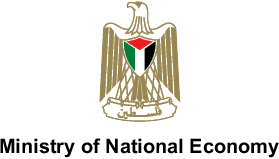
The food industry is considered to be among the oldest industries in Palestine. Our ancestors excelled not only in terms of their skill and craftsmanship but also in their ability to weave a significant part of the Palestinian identity. Accordingly, the food industry sector is considered one of the most vital industrial sectors in Palestine, one that contributes to the gross domestic product, creates job opportunities, helps fight unemployment, and supports political and economic development since the products of these industries are exported to many countries worldwide.
The Ministry of National Economy’s role to organize the industrial sector begins with the licensing process according to the International Standard Industrial Classification of All Economic Activities (ISIC). The food and beverage industry, for example, falls under ISIC Code 10, whereas the processing and preserving of nuts falls under Code 1030. The Ministry of National Economy believes that supporting the industrial sector in general and the food industrial sector in particular is critical for ensuring food security for Palestinians and enhancing our resilience given the challenge we face under the occupation.
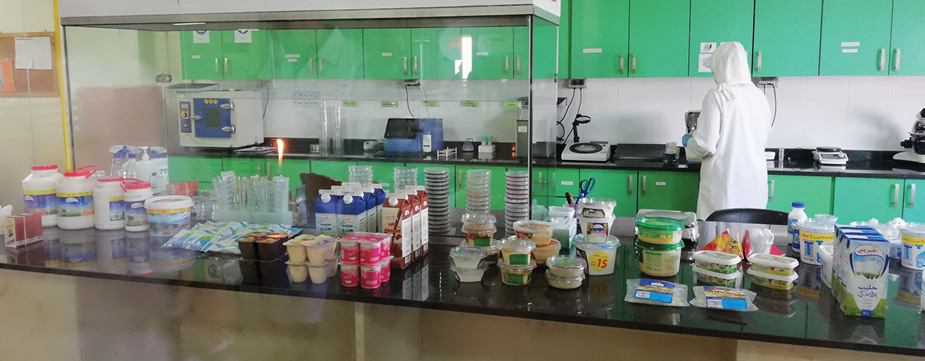
The Palestinian food industries sector consists of many sub-sectors that are ranked differently according to their market share, production rate, and job creation. For example, the meat sector is considered the most qualified sector in terms of international quality certificates. The production and preservation of meat employs 604 workers (which equals 3.44 percent of the total number of workers in the food industry in Palestine), whereas its production rate is 9.93 percent, and it holds 59.49 percent of the market share.
The Palestinian government supports the food industry through the Ministry of National Economy and other related ministries by enacting legislation and drawing up national policies and plans; fostering sustainable development in the agro-industry and related social sector and making efforts to align them with the 17 Sustainable Development Goals; and controlling industrial and consumer practices.
The dairy sector employs 1,968 workers, equaling 11.19 percent of the overall number of workers in the food industry. The dairy farming sector has a production rate of 16.56 percent and a market share of 57 percent. This sector seeks both local and international quality marks such as ISO 9001, ISO 22000, and others, as well as standards certifications, such as the Palestinian Quality Certificate and GMP (Good Manufacturing Practices). These certification schemes guarantee that the sector’s products are of high quality and meet the needs and standards of local and international markets.
The fruit and vegetable processing and preservation sector provides jobs for 1,910 workers, which amounts to 10.86 percent of all workers in the Palestinian food industry. The production rate is 10.94 percent, while the sector’s market share amounts to 52.16 percent.
The vegetable oil production sector is considered one of the most eligible sectors for international quality certificates. The vegetable oil industry has the highest level of exportations in the food industry in Palestine due to the fact that Palestinian olive oil is vital to this sector, with a total output of 19.61 percent. Moreover, 30 percent of the olive oil is consumed locally, whereas 70 percent is exported globally.
The grains and mill products sector employs more than 346 workers, 1.97 percent of the overall number of workers in the food industry. Its production rate is 16.56 percent, while its market share is 15.81 percent. For Palestinian self-sufficiency, however, the production is 9 percent short of the current demand, and thus Palestine must import wheat from abroad.
The cocoa, chocolate, and confectionary sugar sector provides more than 775 workers with employment in Palestine, 4.41 percent of all workers in the food industry. It has a production rate of 2.93 percent, and a 10.84 percent market share.
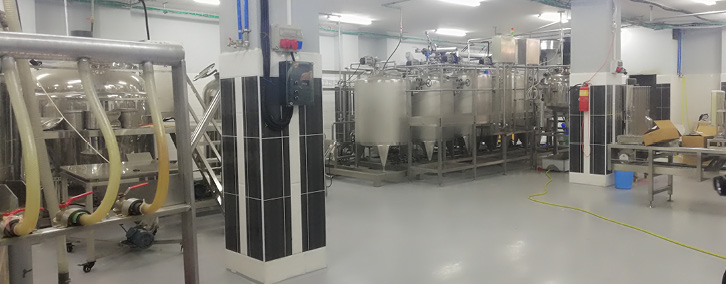
The pasta and noodles sector employs more than 65 workers, which constitutes 0.37 percent of the total number of workers in the food industry, while it has a 10.84 percent market share, and a 2.93 percent production rate.
The bakery products sector employs more than 9,854 workers, 56.04 percent of the total number of workers in the food industry. Its production rate is 37.04 percent, and it has an 81.27 percent market share.
The making of prepared animal feed sector provides jobs for more than 528 workers, which is 3 percent of the overall number of workers in the food industry. It has a production rate of 7.31 percent and a 20.25 percent market share.
Finally, there is the sector of manufacturing other food products that are not classified elsewhere. This sector provides jobs for more than 1,491 workers, 8.48 percent of the total number of workers in the food industry, and has a production rate of 6.43 percent and a 28.29 percent market share.
Many products of the Palestinian food industries in various sectors are exported to a number of countries in varying quantities. Palestinian olive oil export, for example, is a vital segment and contributes a distinctive share to the exported food products with 15 to 20 percent of the total volume of production. Palestine produces between 32,000 to 35,000 tons of olive oil annually, 30 percent of which is consumed locally, while the remaining 70 percent is exported to international markets in the form of trade and gifts. The date-production sector also occupies a distinguished place in terms of Palestinian exports to various world countries. The herbs and aromatic and medical plants sector exports goods to many countries around the world on a daily basis.
The role of the Ministry of National Economy is to register and supervise industrial licensing and engage in market surveillance.
Indeed, food production is considered one of the most significant industries in Palestine, as it reflects the experience gained from international expertise. This sector’s success is illustrated by investments made to enhance the Palestinian workforce through intensive workshops that are held in Palestine and internationally, and through the implementation of the best international techniques in the production processes. Furthermore, the success of this industry is due to progress that has been made along the value chain and in the agricultural sector, making it a most valuable source of raw material for production. Palestine has developed cattle, fish, and poultry farms as well as vegetable and food production facilities, applying modern technologies. This has played a vital role in enhancing the food industry, enabling it to offer high-quality goods and give each commodity a distinct Palestinian taste.
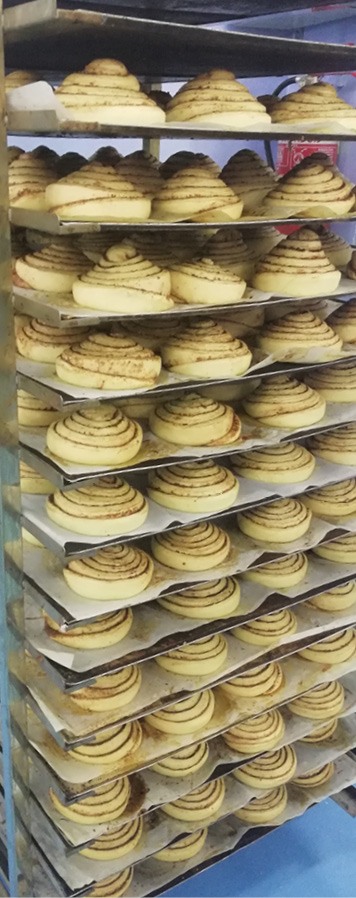
The legislation that has been enacted and the national policies and plans that have been developed to support the industrial sector are aligned with the national policy agenda and economic strategy and include the following:
- Implementation of the Council of Ministers’ Resolution No. 4 of 2013, which grants priority to local Palestinian products in governmental tenders; thus the Ministry of National Economy encourages domestic production by increasing participation in the governmental purchase
- Adoption of the National Food Safety Strategy by the Council of Ministers in 2017, which was prepared by a national team that includes the ministries of health, agriculture, and national economy and the Palestinian Standards and Metrology Institution
-Development of quality infrastructure through launching the National Quality Policy and executing the implementation plan - Adoption of the required food standards, having developed more than 550 Palestinian standard specifications
- Adoption of mandatory technical regulations for the food industry sector, resulting in more than 45 technical regulations
- Modernization of the Intellectual Property Law through a legal committee headed by the ministry
- Preparation of the National Product Protection and Anti-Dumping Law
- The drafting of a Companies Law
- Development of appropriate policies to increase green exports
- Development of the industrial infrastructure through establishing specialized industrial estate and free zones to encourage investors to utilize the one-stop service provided through the industrial zone and modern infrastructure, in addition to the package on the incentive; currently three industrial zones are operational in Jericho, Gaza, and Bethlehem. Those in Jenin and Tarqumia are under construction.
The sustainable development of the industrial sectors is a main priority for the Palestinian Ministry of National Economy and the cabinet. The ministry contributes to the development of the productive, industrial, and commercial sectors by implementing numerous projects. Special focus is given to projects that intersect with the 17 Sustainable Development Goals adopted by the United Nations. Examples include:
- Mustadama (sustainable), a vital project implemented by UNIDO, with EU support, that aims to reduce the energy consumption of 100 factories in both the northern and southern governorates, and seeks to create technical expertise in the energy efficiency field
- SwitchMed TES III, an initiative that aims to achieve a circular economy in the food industries by reducing waste, whether energy, water, or solid waste
- Kaizen Program, a project that aims to develop advisory services, funded by the Japanese International Cooperation Agency and the Japanese Development Agency, through training that fosters Palestinian expertise and competencies in the sector by adopting Japanese approaches and philosophies to achieve the best results.
The Ministry of National Economy supervises industrial licensing, whereby Palestinian licenses are issued according to the international ISIC system for all industries, including the food industries, after all relevant authorities have been contacted and their approval has been obtained. To this end, food factories and other Palestinian industries are visited regularly to check production lines and to issue the annual renewable operating license.
The ministry’s exercise of industrial control ensures that the products and commodities conform to Palestinian standards. This is carried out in the following ways:
- Making field visits to factories in order to monitor the implementation of Palestinian standards throughout the production process. Taking random samples to check their compliance with the related Palestinian standards and the mandatory technical regulations.
- Monitoring the application of mandatory technical regulations for food contacts, e.g., containers in which food is packaged, such as milk cartons.
- Resolving any complaints about and from factories for food products, whether this concerns raw materials, processed materials, price, or any other related complaints.
- Preventing counterfeit in food processing trademarks.
- Supporting local industries by enhancing their competitiveness in increasing their share in local and international markets through encouraging and engaging the local industries in projects implemented by the Ministry of National Economy and supported by various donors.
- Implementing the cabinet’s decision to grant national products in government tenders a 15 percent preference over other nondomestic competing products.
- Issuing the rule of origin certification for domestic products for export purposes, which facilitates the access of Palestinian products to the international and regional markets with no tariff.
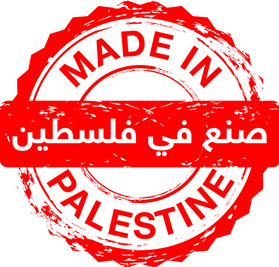
To protect consumers from fraud, particularly when it comes to food products, the Ministry of National Economy monitors the market, ensures that the labelling is compliant with the technical regulation and standards requirements, prevents price manipulation or any other type of exploitation, and verifies the validity of the products from a health perspective. It furthermore resolves complaints from citizens about any problem that may arise, whether it concerns the product or its packaging, price hikes, or services. Finally, given that Israeli settlements attempt to flood the Palestinian market with smuggled illegal and invalid food processing products, the ministry coordinates with all related partners to prevent these products from entering our market and takes legal action against those involved in such attempts.
Translated from Arabic by Khaleel Shaheen


